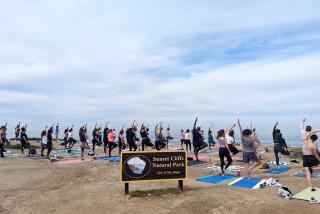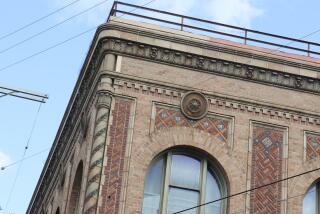GARDEN GROVE : City Seeks to Restrict Buddhist Temple
- Share via
Except for a three-foot statue of Buddha in the midst of bonsai trees, dwarf bamboos and a flower garden, this three-bedroom house looks no different from the single-family homes clustered near a park on West Street.
But once inside, the sweet scent of burning incense greets the visitor. A Buddhist monk in a brown robe is usually found meditating at an elaborate altar decked with red candles, flowers, fruits and more Buddha statues. In the back yard is a garden where worshipers can burn incense or simply sit on benches and meditate.
The Bat Nha Meditation Institute at 12362 West St. is the home of a 2,000-member congregation led by Thich Nguyen Tri.
But city officials want the temple shut down, arguing that it is operating in a residential neighborhood without a permit. Last month, City Atty. John Shaw filed a lawsuit against the congregation in an Orange County Superior Court to stop its operation.
City officials have said that neighbors have complained about the traffic and noise caused by the temple’s operation over the past two years. City codes require that temples and other religious houses be built on at least one acre of land, and provide some kind of buffer between their buildings and nearby homes.
This week, Shaw offered to drop the charges, but under strict conditions, including some requirements that temple officials say would violate their constitutional and civil rights.
“I’m very sad,” Nguyen Tri said Thursday. “I lost everything to the Communists in Vietnam. When I came to America, I thought I will have freedom.”
Under the city’s settlement offer, for example, Nguyen Tri, who owns the house, would not be allowed to admit more than six people at one time.
“It’s outrageous and ridiculous,” said Nho Trung Nguyen, an attorney representing the temple. “What if 20 people come to visit? Would the police come and take them to jail?”
The congregation must also remove the Buddha statue in the front yard, halt classes on Buddhism and completely cease celebrating religious holidays, such as Tet, Buddha’s birthday and the Moon festival.
In addition, a gong that the group uses during religious rites would be removed, and a donation box would not be allowed inside the house. The group would be required to allow city code officials to inspect the property to confirm compliance.
Shaw, in a letter to the congregation May 11, gave temple officials until today to respond to the settlement offer.
“They have indicated they wanted to settle and not get involved in a legal fight,” Shaw said Thursday. “They have acknowledged that they have violated the law.”
But Nguyen, the attorney, said that “there is no way, by reading this proposed settlement, that I would recommend that the temple signs it. It’s clear-cut discrimination,” he said.
He said that it is unfair for city officials to prevent any form of holiday celebration and educational activity in the house.
“Does that mean they can’t talk to children about education? That they can not have friends to sit down at a dinner table to celebrate Tet festival, or Buddha’s birthday?” Nguyen asked.
Councilman Robert F. Dinsen said Thursday that some of the conditions, particularly the one limiting the number of people in the house, could not be enforced.
“No one can stop me from having more than six people in my house,” Dinsen said. “So we can’t stop them either.”
Last month, the City Council allowed another Buddhist congregation, the Chua Duoc Su, to build a 1,500-square-foot temple in a residential neighborhood on Magnolia Avenue.
More to Read
Sign up for Essential California
The most important California stories and recommendations in your inbox every morning.
You may occasionally receive promotional content from the Los Angeles Times.













